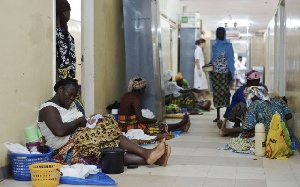Mikidadu Mohammed is Assistant Professor of Economics at Austin College. Sara Schuster is a Pre-Med student at Austin College. Mathias Akuoko is Assistant Professor of Public Health at Austin College. The views and opinions expressed in this article are the authors’ and do not state or reflect those of Austin College, or any agency thereof.
For several decades since independence, many Ghanaians were priced out of the healthcare system due to “cash and carry”, a phenomenon where hospitals and medical facilities, both public and private, will only treat patients if they pay prior to treatment. Then came the Ghana National Health Insurance Scheme (NHIS), established into law in 2003 and implemented in 2005.
The NHIS was touted to remedy the cash and carry system and provide healthcare access to all Ghanaians irrespective of income level. Since its inception in 2005, millions of Ghanaians have for the first time gotten a taste of health insurance, through which they accessed numerous health services. This is indeed unprecedented in the nation’s history.
Despite its many successes in the last fifteen years, the NHIS is currently facing several challenges that raise concerns about its sustainability going forward. Current estimates from National Health Insurance Authority data suggest that enrollment (active membership) decreased by 16 percent between 2008 and 2018. As a share of total population, this represents a decline in active membership from 55 percent in 2008 to 40 percent in 2018. Yet active members continue to have difficulties in utilizing their benefits because only few basic services are covered under the scheme. Others who choose not to participate in the NHIS purchase private insurance which is quite expensive.
All these challenges have led to a trifurcation of Ghana’s healthcare system into an elaborate economic pyramid. At the top of the pyramid are well-off and oftentimes, high-profile citizens who have private health insurance and are able to access the best care in private hospitals.
In the middle are average citizens in urban areas like Accra, Kumasi, Tamale, Nalergu, Sunyani, Wa, Bolgatanga, Cape Coast, Takoradi, Ho, Techiman, and Koforidua who enroll in the NHIS and access basic healthcare at the nation’s public hospitals. At the base are rural folks (the majority) who in most cases don’t have health insurance and even when they do, cannot sufficiently access healthcare facilities because they have to travel long distances to where these facilities are located.
Was this economic pyramid intended? The answer is no. When the universal health insurance idea was conceived and implemented in Ghana, policymakers did not anticipate such trifurcation of the country’s healthcare system.
In fact, they were under the impression that certain illnesses such as malaria, diarrhea, rheumatism, anemia, acute respiratory tract infections, asthma, tuberculosis, typhoid fever, hypertension, intestinal worm infections, acute eye infections, skin diseases, and ulcers are common among most Ghanaians and since all hospitals and medical facilities, both public and private, had the capabilities of treating these common illnesses, providing payment guarantees was the only missing puzzle on the country’s road to a universal health system.
Thus, the government threw its full weight behind the NHIS. However, what policymakers failed to anticipate is that certain chronic and costly diseases like cardiovascular diseases, cancers, and diabetes mellitus do not discriminate between the haves and the have-nots, and hence require universal coverage.
Moreover, while economic growth and development generally reduce the prevalence of some diseases, policymakers were blindsided that rapid economic growth and development also intensify the incidence of new, often very costly diseases to treat such as obesity, stroke, Alzheimers, colon-rectum cancer, leukemia, lymphomas, and neoplasms, which can also increase healthcare expenditure.
Taken together, these two overlooked factors explain the rise of the economic pyramid that underlies Ghana’s healthcare system and its attendant consequence of worsening the health disparities among the three groups: the rich, the average citizens, and the rural folks.
Can we dismantle the economic pyramid? Yes, indeed. However, this will require concerted effort by the government and the general public. We now know that certain chronic and costly diseases do not discriminate between the haves and the have-nots.
We also know that as Ghana seeks more and more economic growth and development, it is bound to expose itself to several chronic and costly diseases that hitherto were not prevalent in the country. Confronted with these realities, what policymakers need to do now is to increase coverage to more chronic diseases and anticipate that even more coverage will be required in the future as the country continues to make its economic ascent. Policymakers should also address the stark deficiencies in rural healthcare services.
Another important recommendation to policymakers is to make the scheme attractive to increase enrollment. Health insurance thrives when the healthy help pay for the not so healthy.
As it is now, majority of the NHIS enrollees are the very sick who are saddled with diseases like diabetes, high blood pressure, heart diseases, and many other chronic diseases. These people pose significant threat to the sustainability of the scheme and spells it doom if care is not taken. Extending coverage to these chronic and costly diseases will obviously necessitate increased allocations to the country’s healthcare expenditure by the government.
It will also require more enrollment by the healthy to help pay for the not so healthy. But the benefits of extending coverage to these chronic and costly diseases will certainly outweigh the costs.
The general public can also assist by making healthy choices, resist the temptation to free-ride, and curb their tendencies toward over-utilization of healthcare services as more and more coverage is provided.
The cumulative effect of these concerted efforts by the government and the general public can dismantle the economic pyramid and open the path to a sustainable universal healthcare coverage for all Ghanaians for many, many years to come.
Opinions of Tuesday, 4 February 2020
Columnist: Mikidadu Mohammed, Sara Schuster, and Mathias Akuoko



















